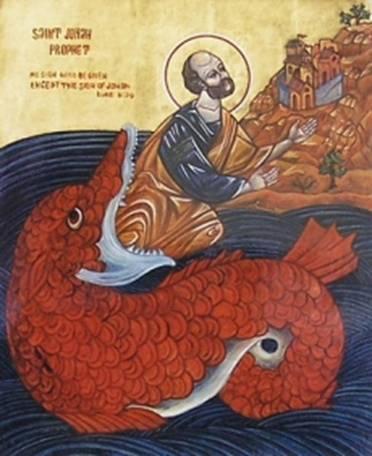Jonah
JONAH
Possible Lesson Plan:
- Open with prayer.
- Scripture Reference: the book of Jonah. Have each group read a chapter. Summarize their findings as a newspaper headline. If you want to, you can bring in newspapers and they can cut out words and glue them into the headline. What point is God trying to make with Jonah?
- History: Jonah lived after Elijah and Elisha and before Isaiah. At the time, the northern kingdom of Israel was being threatened by Assyria. And where was he being told to go – to Ninevah, the capital of Assyria! The ultimate evil! Do you think he would expect a warm welcome in the capital of his country’s worst enemy? Did he have reason to be afraid? Did he have reason to hate the people he was asked to serve? How would you feel if you were asked to serve the biggest bully at school? Meanwhile, Judah, the southern kingdom, was enjoying prosperity under the good kings we studied last week.
- Service References: The story of Jonah in the belly of the whale has been identified as a type of the grave and resurrection of our Lord. The entire book of Jonah is read on Holy Saturday. At matins of the Nativity of the Theotokos, at matins of the Holy Cross, and again at the Transfiguration, we read, “Jonah stretched out his hands in the form of a cross within the belly of the sea monster, plainly prefiguring the redeeming Passion. Cast out from thence after three days, he foreshadowed the marvelous Resurrection of Christ our God…” The Paschal Canon states, “and like Jonah from the whale on the third day, Thou didst arise from the grave.” And the Canon of Holy Saturday matins states, “Jonah was enclosed but not held fast in the belly of the whale; for, serving as a figure of Thee, who hast suffered and wast buried in the tomb, he leapt forth from the monster as from a bridal chamber…” How did Jonah prefigure Jesus?
Jonah in the belly of the fish becomes Jesus in the womb of the Theotokos at matins of the Entry of theTheotokos: “The sea monster spat forth Jonah as it had received him, like a babe from the womb: while the Word, having dwelt in the Virgin and taken flesh, came forth from her yet kept her uncorrupt.” And at the Dormition, Jonah prefigures the 3 days burial of the Theotokos before her translation to heaven: “The fire within the whale, the monster dwelling in the salt waters of the sea, was a prefiguring of Thy three days’ burial, and Jonah acted as interpreter.” How did Jonah prefigure both the Nativity of Christ and the Dormition of the Virgin?
And, not to leave out poor Ninevah, on Cheesefare Sunday we pray, “Save us therefore as of old Thou didst save the people of Ninevah…” What was their response to the message of Jonah? St. Andrew of Crete, in his canon sung during the first week of Great Lent, advises us to follow their example: “Have you not heard how the Ninevites, moved by Jonah's preaching, repented in sackcloth and ashes? Why then have you not followed their example? For in its pride your heart is harder than all that have sinned both before and after the Law.”
- Discussion: Jonah disobeyed a direct order from God. A serious error? What were the consequences? What in our life is similar to Jonah’s experience? Likely we’ll never be asked to travel to Ninevah. But, we all “mess up”. What is mercy? Write a definition. Like Jonah in the belly of the fish, we feel isolated from God when we disobey Him. God’s mercy brings blessing when punishment is deserved. Is there any time this week when you experienced mercy? From a parent, a friend, a teacher, a fellow-driver? What did Jonah do to escape the belly of the fish? What can we do to escape the darkness of being shut off from God? Why does God often choose to show mercy even though we deserve punishment? Do we usually show mercy toward others, or do we like to see people get what they deserve? How can we begin to show more mercy toward others?
- Close with prayer: Have each student consider a situation where he or she usually shows judgment instead of mercy (for those who drive, consider inconsiderate driving habits or road rage). Pray for a change in attitude to one of mercy.
